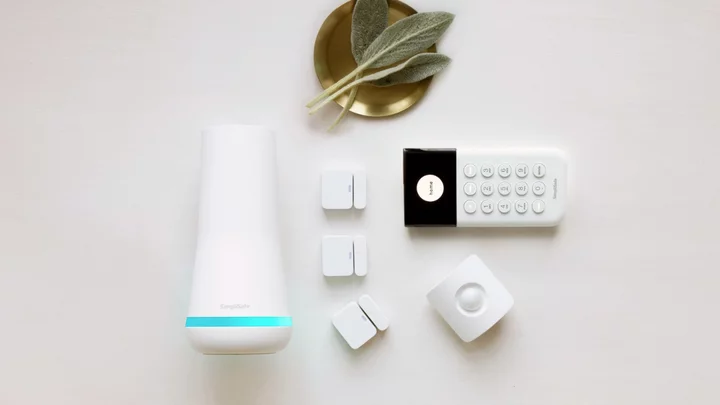Within the sex positivity movement, you’ll see guides on everything from "how to be your empowered sexual self," to "the benefits of regular masturbation," to "different sex toys that will take you to another planet."
But there is something decidedly missing from the conversation: If you’re not having sex, what happens to your brain and body? Like, what actually will happen to you if you abstain?
We’re not talking about the pseudo-scientific claims of the #NoFap community that extoll the ~life-changing~ benefits of forgoing self-touch. This is nonsense and there is no scientific evidence to support any of it. What we’re looking to unpick here are the proven effects of skipping out on sexual stimulation.
Want more sex and dating stories in your inbox? Sign up for Mashable's new weekly After Dark newsletter.
The old, "if you don’t use it, you lose it" phrase comes to mind. Is there any merit to this idea? After all, as Sarah Melancon, PhD, a sociologist, clinical sexologist, and resident expert at The Sex Toy Collective, puts it: "Our genitals were designed to be enjoyed."
"Our genitals were designed to be enjoyed."Sex has been linked to better mental and physical wellness. In fact, a 2016 study in the Journal of Health and Social Behavior found that women who have satisfying sex later on in life might have a lower risk of high blood pressure. Orgasms have consistently been linked to anxiety reduction and better mental health. "Sexual activity serves more than just procreational or recreational purposes," says Dr. Nazanin Moali, PhD a sex therapist and host of the popular Sexology podcast. "It plays a significant role in maintaining physiological health and emotional equilibrium."
This idea of body and mind impact when it comes to a lack of sexual activity is worth exploring. The more knowledge we have, the better equipped we are to make sexual wellness choices that are good for us and our particular situation.
SEE ALSO: How growing up in purity culture impacts sexThe body without sexual activity
Let’s start with what happens to the body when we don’t have sex. Will we fall apart and die? No, obviously not. But there are some serious positives to getting off – and not getting off could mean missing out on them.
Sex can be a form of exercise, which can be greatly beneficial for all folx. "Physical exercise from intercourse helps balance estrogen and progesterone levels, significantly lowering the risk of heart disease," says Rachel Sommer, PhD, a clinical sexologist and co-founder of My Sex Toy Guide.
It’s important to be clear that you can get the same benefits from regular exercise, too … though the Peloton doesn’t offer orgasms, unfortunately.
For penis owners
According to a journal published by the American Journal of Medicine, AMAB (assigned male at birth) people who don't engage in frequent sexual activity are twice as likely to experience erectile disorder than those that engage in sexual activity 1-2 times per week.
Semen retention may also increase your risk of prostate cancer, as studies have shown that regular release reduces your risk. "The implication is that regular sexual activity may have a protective effect on the prostate gland, reducing the potential threat of malignancies," explains Moali.
For vagina owners
People with vaginas may experience vaginal atrophy as a result of a lack of sexual activity – especially penetration. "The vaginal walls become thin and weak while the opening constricts, making sex uncomfortable or painful," Sommer says.
A lack of physical sexual activity can also lead to decreased toning in the pelvic floor muscles. These muscles are responsible for supporting your lower internal organs – and play a big role in managing incontinence. Sommer warns that long periods of abstinence can lead to "negatively affecting sexual pleasure and causing problems like urinary incontinence and pelvic organ prolapse."
Of course, there are ways you can avoid both of these physiological issues without sex. Doing regular pelvic floor exercises can increase pelvic floor function. And if you’re worried about vaginal atrophy, you can always use dilators. Check out this NHS-approved medical guide for more information.
All of this is to say: You don’t NEED to have sex to have a healthy body, but it can help.
The mind without sexual activity
Intimate touch has been shown to decrease cortisol, the body’s stress hormone. This isn’t necessarily sexual – hugs, kisses, and handholding can also have this effect. When we forgo intimate touch, we can experience "touch starvation" wherein we become anxious, depressed, and generally agitated. The vast majority of humans require social interaction and touch to thrive.
And then, of course, there are the benefits of orgasm. Orgasms produce oxytocin, which plays a part in our overall wellbeing. Oxytocin is a natural pain-reliever – and studies show that this heavyweight hormone helps to decrease anxiety.
Even non-orgasmic pleasure can boost our health. During foreplay and sexual excitement, your brain naturally releases the chemical serotonin, which helps to increase sexual satisfaction and regulate mood. Self-love offers a cocktail of brain-regulating joys.
SEE ALSO: What to do when body image is affecting your sex lifeWithout orgasms, anxiety can increase. Orgasms are a way to relieve pent-up energy and anxiety. Sure, there are other ways to relieve anxiety outside of orgasm, but being sexually pent-up is a real thing – and it doesn’t make the vast majority of people feel super great. Keep in mind that you don’t need a partner to enjoy orgasms.
Masturbation is self-care. (Check out our guide to creating a masturbation routine to learn more).
Of course, some people don’t want sex (and that’s A-OK)
With all that being said, we have to be very sensitive to our asexual/ace pals – specifically those who don’t want or like sexual activity. If you don’t desire or want sexual activity, what happens?
There’s nothing wrong with being asexual and/or not wanting sex – just so we’re very clear. The mind and body benefits of having sex/orgasms is very based on the context of the situation and the desires of the person/people at hand.
SEE ALSO: 'Ace' is the first book of its kind. Here’s why anyone, asexual or not, should read it.Listen, we get that the idea of vaginal atrophy or prostate cancer can be scary for people who have little to no sexual interest. Asexual people may not want to engage in sex – partnered, solo, or otherwise – and that is perfectly fine. If you don’t want to be having sex or having sexual activity, you don’t have to. Doing something you find unappealing, repulsive, or distressing is not going to improve your mental health. Melancon adds that those who don’t engage in sex may "miss out on the benefits of sex but engaging in sex you don’t want is probably more harmful mentally and emotionally."
So, if this is you: Don’t worry about it. You do you.
What’s more, people with certain sexual health disorders may also be unable to have sex or find sex painful. For instance, people with vaginismus, vulvodynia, or endometriosis may find penetrative sex (or some or all kinds sex) painful and/or uncomfortable. While many sexual dysfunctions are treatable with the help of a qualified sex therapist, pelvic floor physical therapist, and other relevant healthcare providers, sex can still prove to be challenging. This is totally valid and we hear you. You should only ever engage in sexual activity that feels good and pleasurable for you.
SEE ALSO: How to spice up your sex life when you have endometriosisWhat’s more, you might not be asexual, but simply decide you don’t want and/or enjoy sexual activity, and that is OK too. You are the captain of your own sexual wellness journey.
At the end of the day, it’s about what YOU want. "Ultimately, it's about recognizing and honoring one's own sexual needs and desires," Moali says. There’s no judgment here. Everyone should do what makes them happy and brings them pleasure.
"As long as we’re making the choices that work best for our mind, body, and life more broadly, the “right” amount of sex for any individual can vary widely," Melancon adds. All of this is to say: Get on with your bad self and do what makes you happy.









